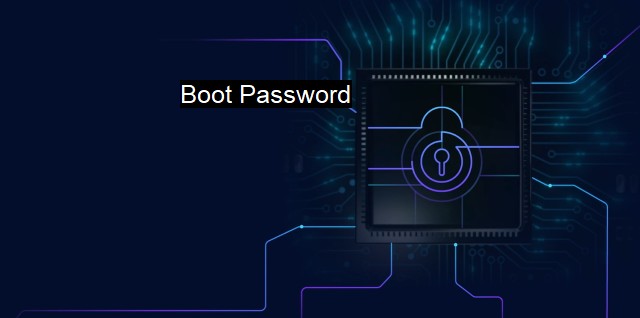What is Boot Password?
The Importance of Boot Password in Computer Security: Protecting Your BIOS from Unauthorized Access and Hacking Threats
A boot password, with refers to the protective layer that requires authentication prior to the execution of the operating system of a computer or any digital devices. This sort of passkey holds a higher level of authority relative to the ordinary account password, permitting the user to have control over the entire operating system.The main purpose of boot passwords is to give an added protection to prevent unauthorized users or malicious applications from booting, or restarting, the system, further attempting access to the system, and thereby compromising it. Unlike user account passwords that shield specific accounts and their respective data against unauthorized exposure, boot passwords safeguard the entire system starting from the initiation point.
Boot password fosters system integrity which is quite imperative in the realm of cybersecurity. Ranging from personal computers to intricate network systems employed in multinational corporations, the deployment of a boot password serves as an imperative wall of defense against potential bouts of security breaches. Despite its almost insignificant or rudimentary outlook, it can be effective in restraining illegal entrants and the highly debilitating downside that it could inflict, especially on enterprise levels where trade secrets may be at risk.
Some may contend that a boot password is a plain limb of protection primarily creating nothing more than an inconvenience to the authorized users because advanced hackers have known how to get past them. It is true that hackers with sufficient knowledge and resources could penetrate even the most secure codes. That is why the boot password shouldn't function as the sole defense but has to go hand in hand with other security mechanisms in place, for instance, using an antivirus.
In relation to antivirus software, the boot password plays a crucial part in the fight against cyber threats. In instances where these malicious programs attempt to modify or corrupt the system from the booting stage, entering a boot password can potentially hinder their initial execution. This gives users the opportunity to identify and wipe out the threats before running their system.
Remember, using just a boot password without antivirus software would make the technique flawed. Antivirus, for instance, scans files and alerts users once any suspicious activity is discovered which helps to limit the extent of damage if an attack occurs on the system. It checks for any known malware that tries to sneak into the system from email attachments, downloads, or storage devices, while a boot password provides higher-level security by scanning the entire system rather than just an individual file.
Boot passwords should be made using a strategic combination of characters along with an antivirus software that is regularly updated to accommodate new viruses and malware. Two-step verification, biometric data, encryption, network access control, and firewalls can also fortify the boot password defense system and the overall safety levels of a system.
Therefore, a boot password can serve significantly toward a robust cybersecurity attack prevention strategy. Keeping its potential vulnerabilities in context, it's advised to incorporate it with other measures, such as encryption, network security devices, intrusion detection systems, two-factor authentication, and extreme caution on the user’s part while dealing with emails, attachments, and downloaded files in general.
a boot password acts as a first-line defense in protecting systems against unauthorized access or potential attacks. When consolidated with other cybersecurity protocols and strategies, such as antivirus software, it can enhance the security of your device and help preserve the sanctity and integrity of your information. It may not be invincible, but it's a solid step in creating layered security that all computer systems need in this digital age. Its effectiveness largely depends on it being a part of a well-rounded cyber defense strategy.

Boot Password FAQs
What is a boot password and why is it important?
A boot password is a security protocol that requires a user to enter a unique password in order to start up a computer or operating system. It is important because it prevents unauthorized access to sensitive data and protects against cybersecurity threats.How do you set up a boot password on your computer?
To set up a boot password, you will need to access your computer's BIOS settings. Once you are in the BIOS, navigate to the security settings and enable the option for a boot password. You can then enter a unique password and save your changes.Can antivirus software protect against boot password attacks?
Antivirus software is designed to detect and remove malicious software from a computer. While it can help protect against some types of cybersecurity threats, it cannot prevent a boot password attack. It is important to have a strong and unique password to protect against these types of attacks.What should you do if you forget your boot password?
If you forget your boot password, you will need to reset it through your computer's BIOS settings. This typically involves removing the battery from the motherboard or using a reset jumper. However, it is important to note that this can erase all data on the computer, so it should only be done as a last resort.| | A | | | B | | | C | | | D | | | E | | | F | | | G | | | H | | | I | | | J | | | K | | | L | | | M | |
| | N | | | O | | | P | | | Q | | | R | | | S | | | T | | | U | | | V | | | W | | | X | | | Y | | | Z | |
| | 1 | | | 2 | | | 3 | | | 4 | | | 7 | | | 8 | | |||||||